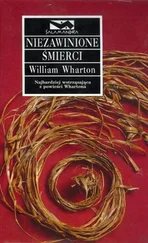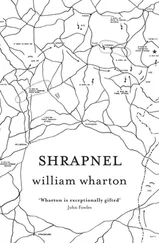He comes back to the surface every fifteen minutes or so and tells us with hand signals and head shaking that he’s found nothing, no hole. He gives the signal to start the smaller of the two pumps. Water is rushing out again. This time, after only about five minutes, he comes staggering up the slippery bank clasping something in his left hand. His brother turns off the pump and opens the helmet.
M. Teurnier pushes his hand in front of my face, stares at me with his violet-blue eyes.
‘On vous a bien eu.’
I don’t know what this means any more than coulé . A young woman on the bank shouts to me in British English. I listen hard after all the noise.
‘Monsieur, he says you have been had!’
I also keep hearing another word that sounds like scaf on drier or maybe that’s several words run together. I look up at her.
‘Monsieur, don’t you realize how lucky you are? They are scaphandriers and the work is very dangerous.’
I look down at M. Teurnier. He seems to be embarrassed. I feel the rotted wood in his gloved hand. It’s like sponge. Maybe this is lucky, but it doesn’t seem like that to me. M. Teurnier undresses from his diving costume, stands briefly, shivering in his briefs, and dresses in his work clothes again. We walk across the street for a beer. I invite the young woman to join us. She’s somewhat leery, and I don’t blame her. I beg her to translate, she agrees and I order her a beer.
She’s all excited, it’s as bad as Rosemary with this damned boat when she first saw it. She babbles on in English.
‘These men are called les pieds-lourds because of the heavy leaded shoes they wear. This équipe that’s working on your boat is famous. Originally, it was a father and his sons. The father started as a scaphandrier in 1912; they specialize in renflouage , that is, bringing up sunken boats such as yours. You should be very proud.’
I don’t want to hear any more. This woman must be mad. I stare at her.
‘How do you know all this? It seems like very specialized knowledge, especially for a young Englishwoman like you.’
She smiles at me.
‘I am a student at l’École des mines . Also, I have always had a special interest in underwater work. A friend of mine told me about your boat sinking, and I came here to watch.’
Over the beer, M. Teurnier explains through the young woman that there is at least one completely rotten plank going from one side of the boat to the other. This is what blew out and caused the boat to sink.
‘But is it possible to bring it up again?’
His answer translates into the idea of shoving some large sheets of plywood under the suspect section, pumping to see if the boat will come up, then inspecting the damage.
The Surfacing Whale
So, that’s what we do. M. Teurnier dresses again in his diving costume, forces pieces of plywood under the leaking sections, then gives the signal for the pumps to start.
This time the boat starts rising and keeps on rising. Again it’s like a huge whale surfacing, only alive and well, more or less well. There are shouts of encouragement and applause from the village people along the bank. M. Teurnier stays down, manipulating the plywood until the hole or holes in the hull are covered. Within half an hour, the boat, filthy, waterlogged, has surfaced. M. Teurnier opens the only door to the cabin fully, and the last of the water flows out. I walk over the slippery gangplank and go inside. The entire interior is covered with dark brown mud, the consistency of thick crème fraîche , or nonemulsified peanut butter.
Again, like a latter-day astronaut, he’s undressed by his brother and jumps into his regular French blues. We go back to the café. The young woman who has been translating and instructing me as to the mysteries of les scaphandriers says she has a class and must leave. I try paying for her help with nonexistent money, but, thankfully, she’ll take nothing, which is about what I have to offer. She wishes me good luck and bon courage . Good luck, courage and more is what I need, all right.
We eat lunch at the nearest routier. Les frères Teurnier discuss what can be done. After a full bottle of wine and steaks with frites , we drive in the truck to a building-supply house. M. Teurnier buys five sacks of premixed, quick-drying, anhydrous concrete. We drive back to the scene of the crime, remove the rotted parts of the guilty board and pour the concrete over the entire area, mixing it with river water. We keep building small dams to hold the concrete in place over the damaged sections. We watch to see if the water will seep through or around it. M. Teurnier keeps looking out one of the mud-smeared windows. Everyone, except me, lights up cigarettes. Then he points out the window. One of the plywood pieces is floating away. He pulls it in with a grappling hood, then manages to hook the other as it too loosens. He’s smiling. Finally, I understand what’s happening. Now there’s no longer the pressure of water onto the boat holding the boards against the hull, so it means the leak is effectively stopped – more or less, that is.
We smile all around, a bottle of wine is brought out from the back of the truck and they somehow manage to open it with a bent nail. I don’t know what to do next. M. Teurnier takes his slug at the bottle and passes it on.
He pulls me along with him to the boat just next to mine, downriver. He rings a bell hanging on the door, till somebody comes. It’s a very dignified-looking Frenchman. M. Teurnier rattles away in his Breton French. The man looks at me and speaks in French-accented, but clear, English.
‘I always knew that boat would sink someday, wooden bottom and no one taking care of it. You must remember, monsieur, you have bought a boat with a house on it, not a house with a boat under it. There is a big difference.’
So I’m not ready for more lectures. M. Teurnier explains the problem, I can see from his pantomime. He does it even when he’s speaking French to another Frenchman. He looks at me. The man, whose name is M. Le Clerc, looks at me. He shrugs and then concentrates.
‘I do not belive any chantier , I mean slip, around here would take a noncommercial ship with a wooden coque for repairs. You could have a sabot , a metal shoe, made and slipped under your boat, but that would be very expensive. I do not really know, monsieur. Perhaps it is best to accept the loss and have the boat destroyed. It will be nothing but souci , trouble, otherwise.’
His wife comes out with some cold white wine and frosted glasses on a tray with white napkins. She offers the tray around. I think of the bottle of red we’ve just slurped down, each wiping his lips on mud-encrusted sleeves of ‘blues’, after drinking. Contrast, the punctuation of life.
When we finish, M. Le Clerc gives us a slight bow of dismissal, his lovely tall wife smiles and we leave. His boat is really a masterpiece of how one can live in style on the Seine. I look back. It lies low in the water, and the upper floor has amber translucent windowpanes all along its length. I find out later it was once a chapel. River people who worked on the Seine used to thank the river gods or whatever gods they could count on for help there.
I pay M. Teurnier the two thousand francs, counting them out until there are only two bills left in my hand. He pulls a pencil from his ‘blues’ pocket and writes his name, address and phone number. With his thumb, he points to the boat, then with his finger points to his chest. I get the message: If I need help, call. They drive off. I hope one of them is the designated driver, but that doesn’t sound very French.
Читать дальше












